Psychology AQA A Level: Issues and Debates
1/94
There's no tags or description
Looks like no tags are added yet.
Name | Mastery | Learn | Test | Matching | Spaced | Call with Kai |
|---|
No analytics yet
Send a link to your students to track their progress
95 Terms
Bias
A distortion in representation of a group/data. A view is biased if it leans toward a subjective opinion, rather than objective reality.
Universality
Idea that psychological characteristics are common to all people, despite differences of upbringing, gender or cultural background

Gender bias
Misrepresentation of gender differences and similarities between males and females
What are the two types of gender bias?
Beta bias and alpha bias
What is an example of androcentrism?
Male anger is seen as a rationale response to external pressures (sexual jealousy, infidelity) however female anger is less accepted

Androcentrism
Masculine perspective taken with male behaviour as the norms.

Alpha bias
Exaggeration of gender differences
Beta bias
Minimisation of gender differences
What is an example of alpha bias?
Freud claimed that identification processes are weaker for females than males as girls do not experience castration anxiety. As a result, Freud claimed females are morally inferior to males.
What is an example of beta bias?
The fight or flight response. Early research was only conducted on male animals as it was thought female hormones fluctuate too greatly. Taylor (2000) claimed that women are more likely to respond to stressful situations with 'tend and befriend'. This early research into fight or flight misrepresented women.
Cultural bias
The tendency to judge all people in terms of your own cultural assumptions
Ethnocentrism
A belief that one cultural group in superior. Researcher takes their own cultural behaviour as the norm

Cultural relativism
Idea that behaviours observed in research can only be understood from the perspective of its cultural context.
Imposed etic
Where a researcher develops a theory or measurement of behaviour within a culture then applies it to other cultures

Etic approach
Looks at behaviour from the outside of a given culture and attempts to describe universal behaviours

Emic approach
Looks within cultures and identifies behaviours specific to that culture

What did Heinrich (2010) find about cultural bias?
Found that most psychological findings were based on WEIRD participants (western, educated, industrialised, rich, democratic). 68% of research subjects, from 100s of studies in leading psychology journals, came from the US. 96% came from western industrialised nations.

How did Gould (1981) show that cultural biases can have significant implications?
First IQ tests in the 1930s led to eugenic social policies in the US. The tests were culturally biased (included items on American products and presidents). Therefore those from SE Europe and African-Americans received the lowest scores. As a result, ethnic minorities were deemed 'feeble-minded' and denied educational and work opportunities.

How has gender bias led to negative stereotypes and discrimination?
Science leads to real world applications - if these are based on biased research, it could provide 'scientific' justification for denying women opportunities. E.g. Tim Hunt, a biochemist, famously told a conference the trouble with girls in the lab is that men fall in love with them and cry when criticised. Gender bias can have damaging consequences which affect the lives and prospects of real women.

How is cultural and gender bias diminishing?
Psychology is changing, with an increased prominence of female psychologists (Loftus, Ainsworth) and now majority of studies control for gender. However many influential research included male participants only (Milgram, Zimbardo, Asch).
Why is research still likely to have biased samples?
Majority of research will likely continue over-representing American college students due to ease of opportunity sampling.

What is support for the idea of universality?
Cultural differences should not be assumed. Some behaviour is universal- Ekman (1989) suggests that basic facial expressions for emotions (e.g. happiness or disgust) are the same all over the human and animal world. Features of human attachment, such as imitation and interactional synchrony, are universal.

How can gender bias be avoided in research?
- Promoting universality: men and women are far more similar, than they are different
- Women should be studied within meaningful real-life contexts and genuinely participate in research, rather than being the objects of study.
- Diversity within groups of women should also be studied rather than comparisons between women and men.
- There should be greater emphasis on collaborative research methods that collect qualitative data as opposed to numerical.
- There should be a greater focus on research into women dominated areas.

How can cultural bias be avoided in research?
- Do not extrapolate findings/theories to cultures which were not included in the sample
- Use researchers who are native to/familiar with culture being investigated
- Carry out cross-cultural research rather than research with one culture
- Do not assume universal norms across different cultures
- Be sensitive to cultural norms when reporting findings
- Taking a reflexive approach (constantly reflecting on own biases when carrying out research)
Nature-nurture debate
To what extent behaviour is determined by nature heredity (genetics) and nurture environmental (external) factors and the relative importance/combination of both.
Nature
The view that behaviour is a product of genetic or innate biological factors. Knowledge is present from birth (innate).

Heredity
Process in which traits (physical and psychological) are passed down through generations. Genetic inheritance

Nurture
The view that behaviour is a product of environmental influences (learning = classical and operant conditioning). Knowledge comes from interacting with the world. Mind starts as a blank slate 'tabula rasa'.

Interactionist approach
The view that both nature and nurture work together to shape human behaviour
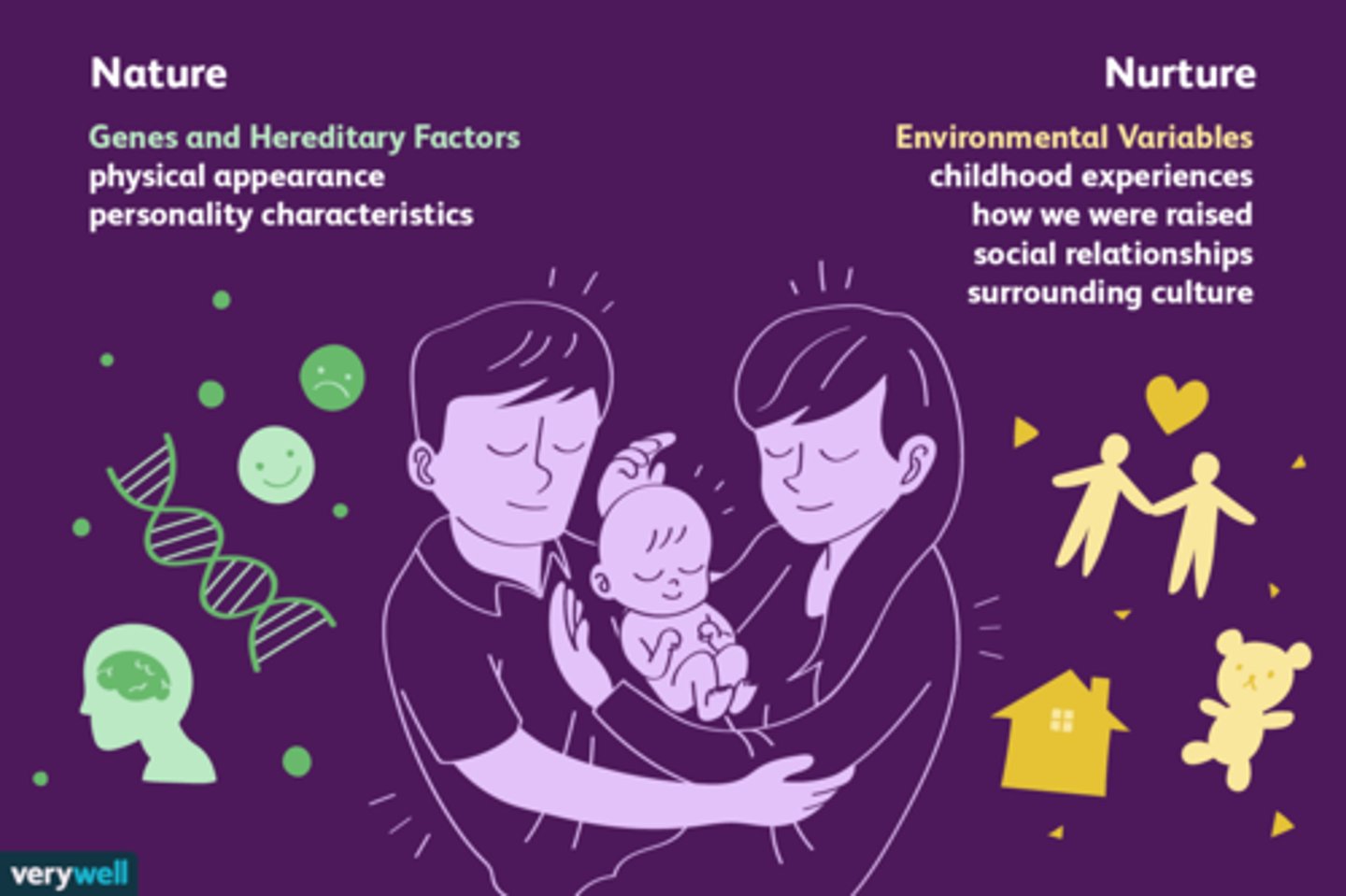
What are examples of the interactionist approach?
Diathesis stress model and epigenetics.
Diathesis-stress model
A theory suggesting that mental disorders are caused by a combination of inherent factors (predisposition) and stressful life experiences.
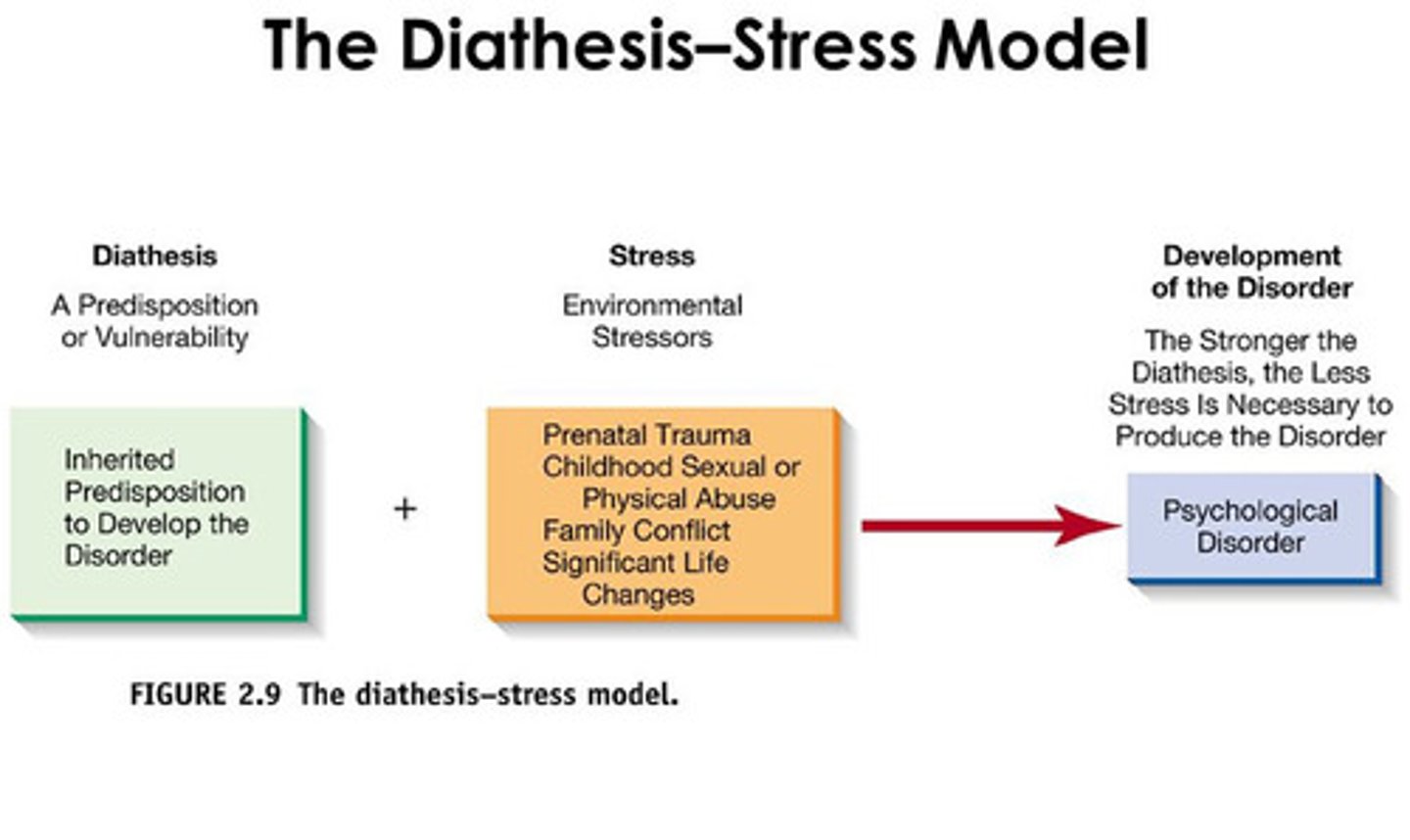
Diathesis
A vulnerability or predisposition to developing a disorder. Can be due to genetic factors, early life experiences or other biological susceptibilities
Stress
The environmental factors that trigger the onset of mental illness or exacerbate current existing conditions. These can include significant life events, trauma and daily stressors.
Epigenetics
The study of how behaviours and the environment can cause changes in the way your genes work. Some genes are not present at birth and only become expressed in response to a life event.
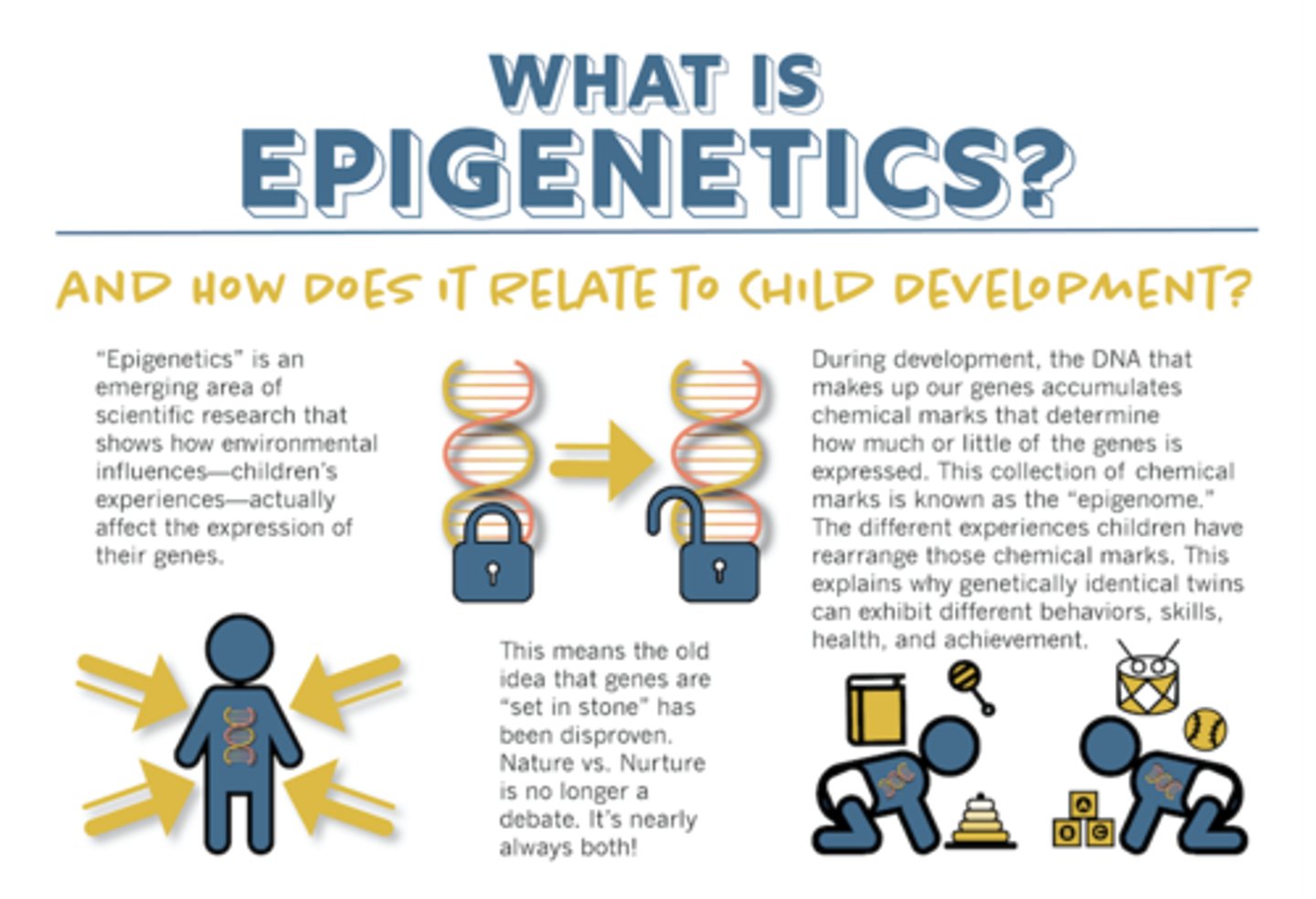
Which approaches take a nature perspective?
Psychodynamic
Biological
Cognitive
Which approaches take a nurture perspective?
Psychodynamic (experiences can result in fixation)
Biological (environment influences brain development)
Cognitive
Behaviourist
Humanistic
What is support for the nature perspective?
Biological evidence - disorders like schizophrenia, evolutionary arguments for mate preference, neurotransmitter evidence for aggression (dopamine/serotonin)

What is support for the nurture perspective?
Environmental evidence - SLT Bandura's bobo-doll study, behaviourist studies on conditioning (Pavlov's dog, Skinner's box)

What is a limitation of the nature-nurture debate?
Nature and nurture cannot be separated. Plomin suggests people create their own nurture by actively seeking environments that are appropriate for their nature. Plomin refers to this as 'niche-picking'

What are implications of an extreme nature perspective?
The idea that traits (e.g. intelligence) are linked to race or genetic makeup. Socially sensitive research.

What are implications of an extreme nurture perspective?
The idea that any behaviour can be changed by altering the environment, leading society to control and manipulate its citizens.

Determinism vs free will
Explores the extent to which our thoughts and behaviour are influenced by forces outside of our conscious control

Determinism
The view that behaviour is shaped by internal or external forces that we have no control over. Free will is an illusion.
Hard determinism
All human behaviour has an internal or external cause that can be investigated. No free will over behaviour = fatalistic
Soft determinism
Behaviour is largely shaped by deterministic factors (biological, environmental) but still some role for conscious decision making (free will)
Free will
Our decisions and behaviours come from personal conscious decision making. Behaviour is not determined by internal or external forces. Free from causal influences

What are the 3 types of determinism?
Biological, environmental and psychic determinism
Biological determinism
The idea that human behaviour is innate and determined by biological influences (neurotransmitters, genetics)
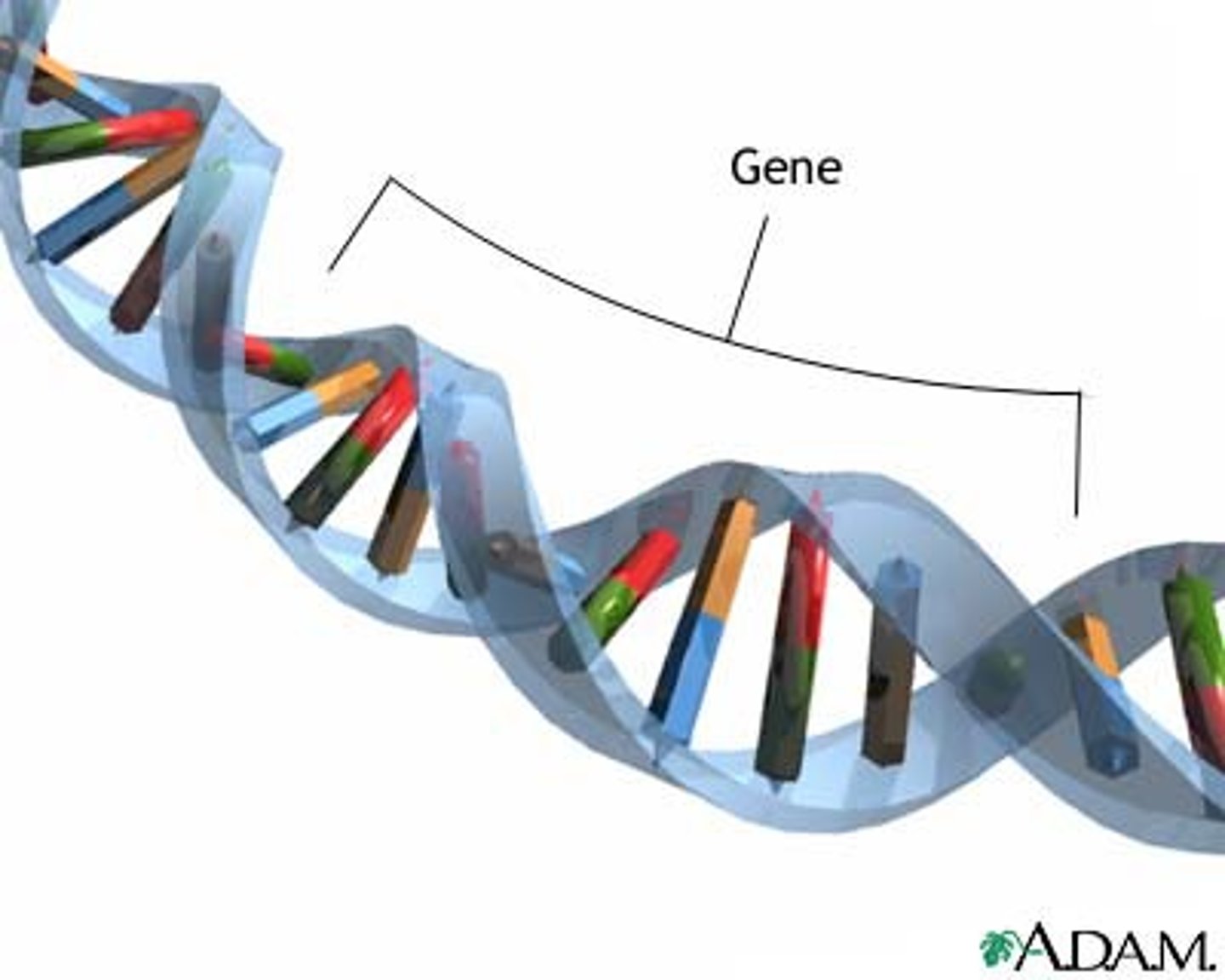
Environmental determinism
Behaviour is caused by external factors of the environment (e.g. learning through classical and operant conditioning)
Psychic determinism
Behaviour is the result of innate drives (such as the ID, ego, and superego) and unconscious conflicts

Causal explanations
Scientific - using controlled conditions to demonstrate a causal relationship between changes in the IV and changes in the DV. You are looking for a cause and effect, therefore science is deterministic

Which approaches are deterministic?
Psychodynamic (hard/psychic determinism)
Biological (hard/biological determinism)
Behaviourist (hard/behavioural determinism)
Cognitive (soft determinism)
Which approaches support the idea of free will?
Cognitive (soft determinism)
Humanistic
What is support for a deterministic view?
Determinism is scientific. It has had practical applications, as researching into prediction/control of behaviour has led to the development of therapies and treatments that have benefitted many, e.g. psychotherapeutic drugs in management of schizophrenia

What are the implications of determinism for the justice system?
It undermines the principle that the individual is fully accountable for their actions. Determinism would suggest they didn't have any control over their behaviours and therefore it would be unfair to punish them.

What is a problem with determinism?
It is unfalsifiable. It's based on the idea that causes of behaviour always exist even if they haven't been identified.
What is support for the idea of free will?
Free will has face validity: personal experience suggests we make our own decisions and act after conscious thought.
What did Roberts et al (2000) find about free will?
That adolescents who did not believe in free will were at a higher risk of depression.

What research questions the idea of free will?
Libert (1983)
Libert (1983)
Used EEG research. Participants had to press a button with either the left or right hand. Showed that brain regions act before consciousness is aware of the decision (up to seconds). It was later backed up by FMRI, Hynes (2008)
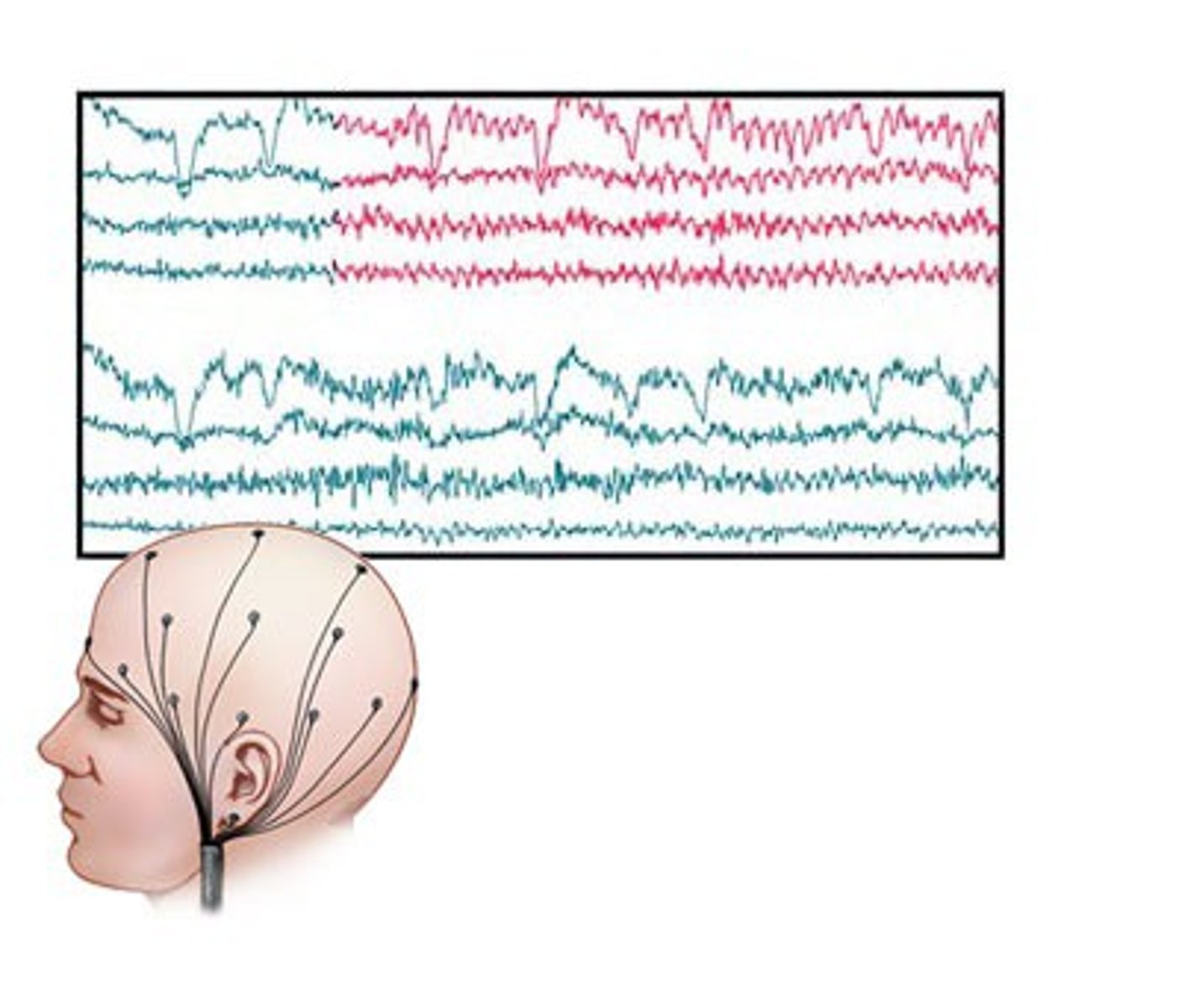
Holism
The idea that to understand people, you must study the whole person, taking full account of individual experience, emotion, choice, and the individual's world view.

Reductionism
Explaining behaviour in terms of its constituent parts (basic units) and explaining at the simplest level. This is based on the scientific principle of parsimony.

Parsimony
Simple explanations are preferred to unnecessary complexity
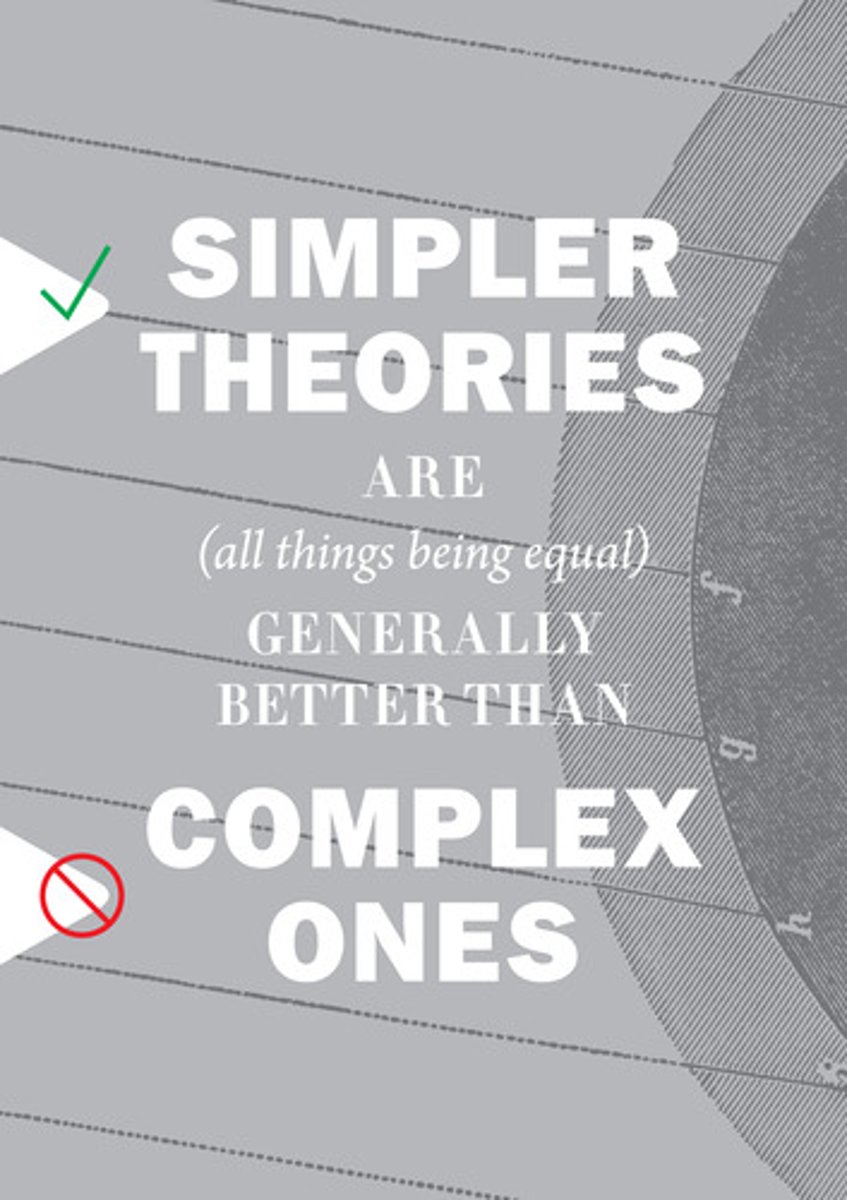
Levels of explanation
The perspectives that are used to understand behaviour. The lowest level considers physiological/biological explanations, the middle level considers psychological explanations and the highest level considers sociocultural explanations.
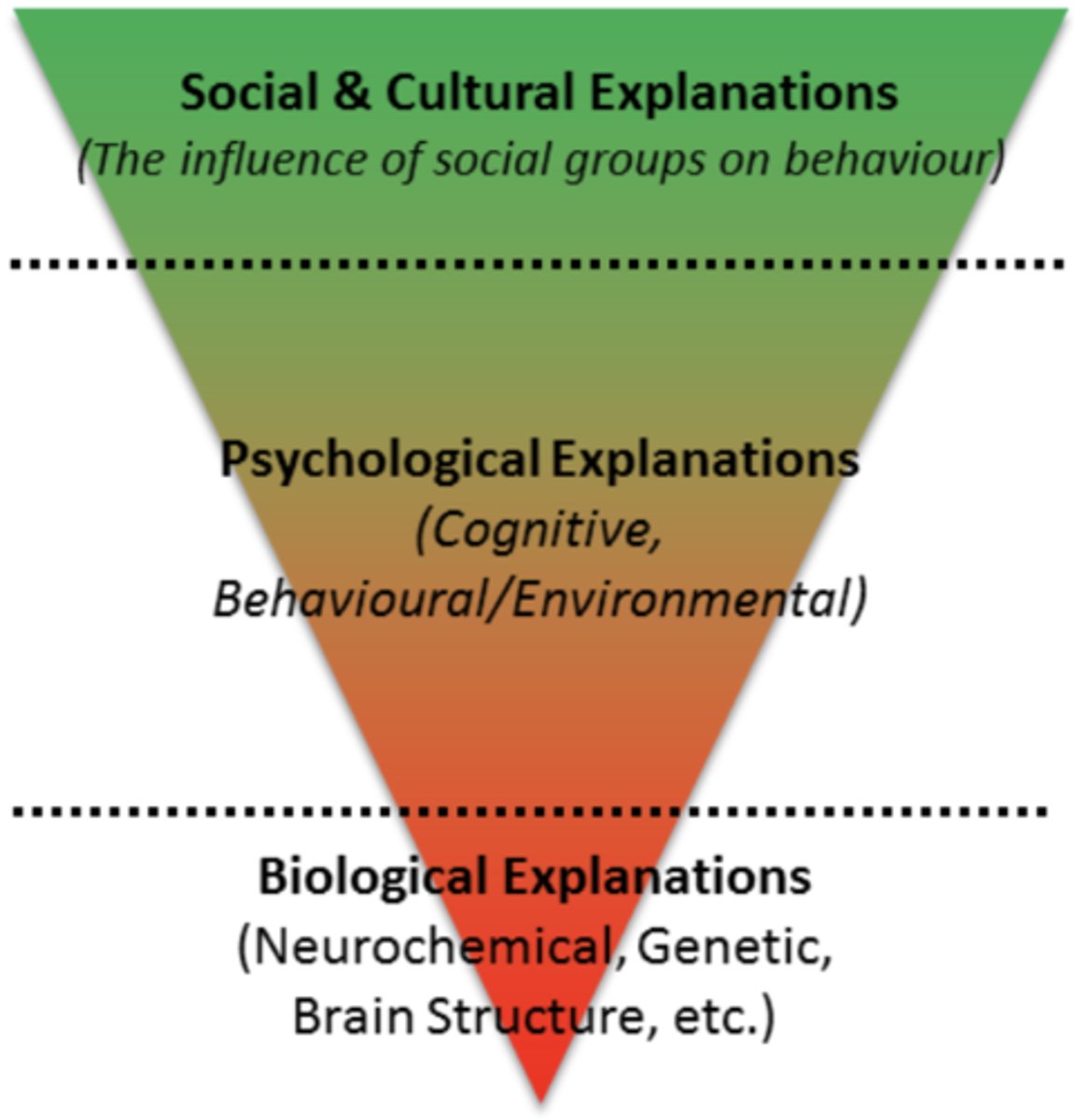
What would the biological level reduce complex behaviours to?
Neurochemical, physical structures, evolutionary and genetic influences.

What is environmental reductionism?
The attempt to explain all behaviour in terms of stimulus-response links that have been learned through experience.

Give an example of the levels of explanations for OCD.
Socio-cultural: people find excessive hand washing odd/irrational
Psychological: experience of obsessive thoughts
Physical level: sequence of movements involved in hand washing
Physiological level: hypersensitivity of the basal ganglia
Neurochemical level: underproduction of serotonin
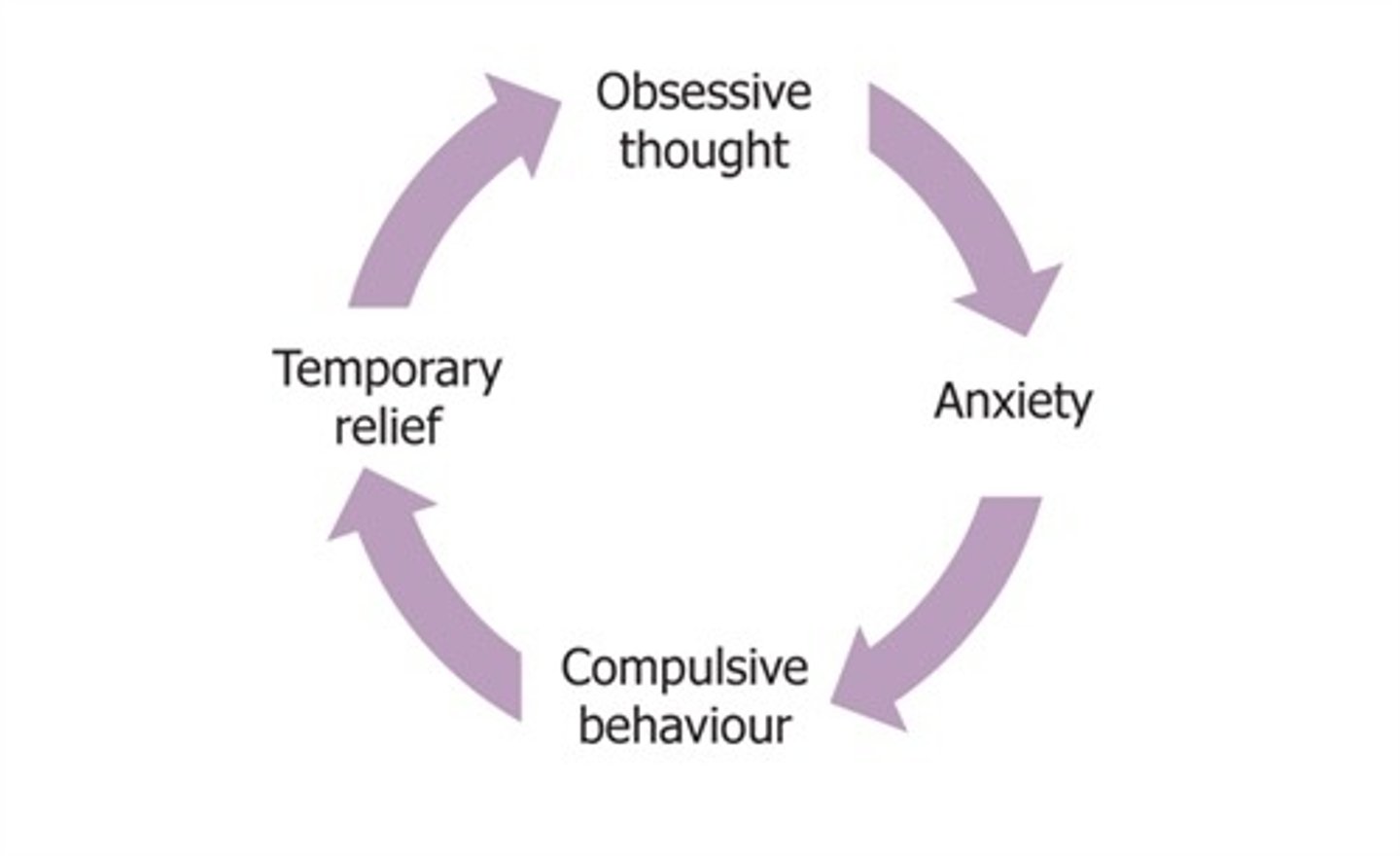
What approaches are holistic?
Humanistic
Psychodynamic
Which approaches are reductionist?
Biological (biological reductionism)
Cognitive (machine reductionism)
Behaviourist (environmental reductionism)
What is support for reductionism?
Practical explanations - reducing mental illness to biological causes leads to development of drug treatments. However drug treatments have issues, the combination of CBT and drug treatment have been proven to be most effective.
What is support for holism?
There are aspects of social behaviour which can only be understood from the context, e.g. group context and not individual group members for processes like conformity and deindividuation.

What is a limitation of holistic explanations?
They are not backed by science. E.g. Humanistic psychology is criticised for its lack of empirical evidence, and is instead seen as a loose set of concepts. If multiple factors influence something, it is more difficult to research it which leads to lack of evidence.
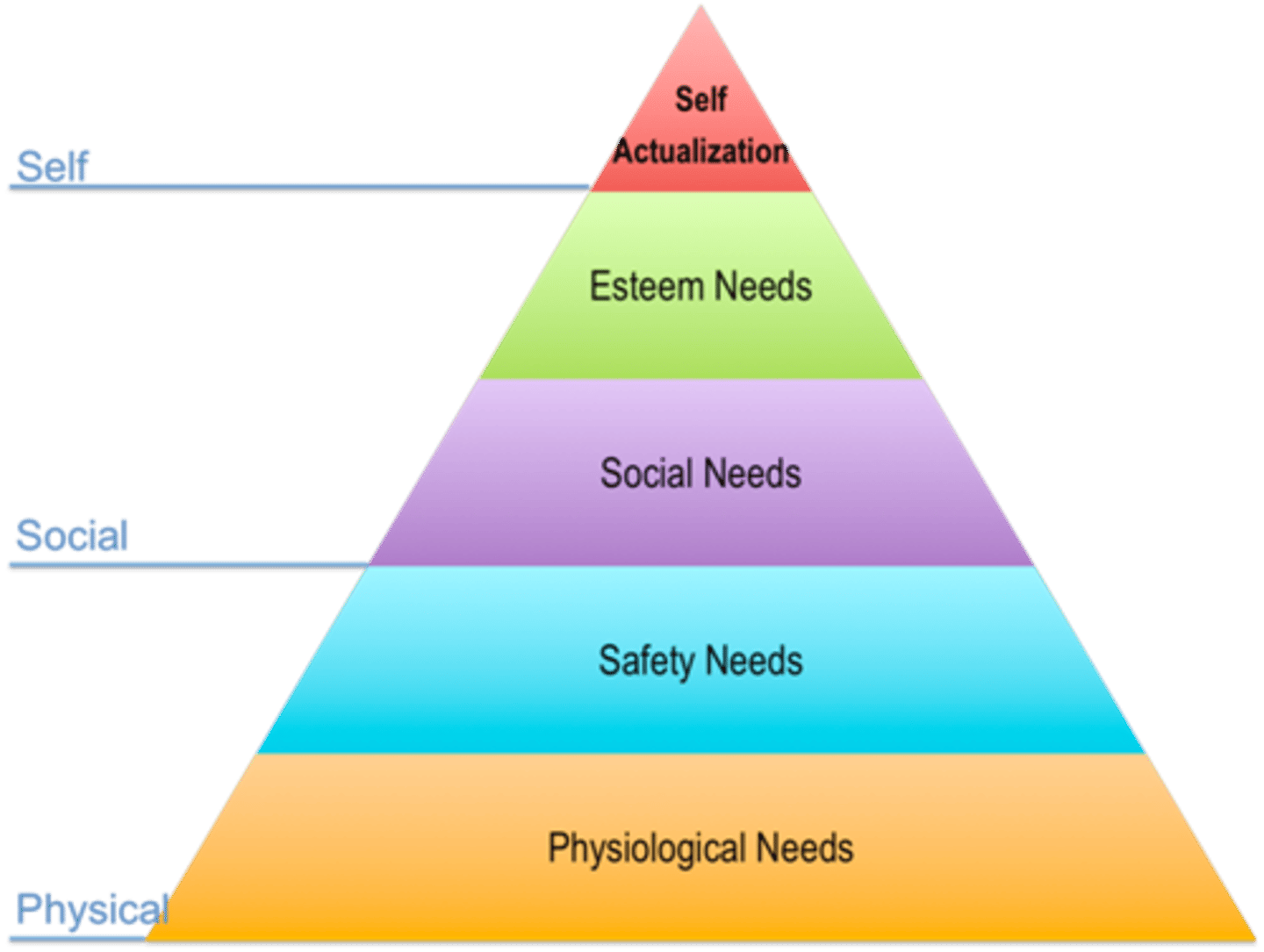
What are arguments against reductionism?
Reductionist approaches have been accused of oversimplifying complex phenomena leading to a loss of validity. Biological explanations (gene, neurotransmitter, neuron) do not include an analysis of the social context within which behaviour occurs. If important explanations for mental illness are ignored, it could lead to reoccurrence of the disorder as other causes haven't been considered.

Idiographic approach
Studying and understanding unique individual experience. People are studied as unique entities, each with their own subjective experiences and values. More about understanding behaviour rather than formulating general laws.
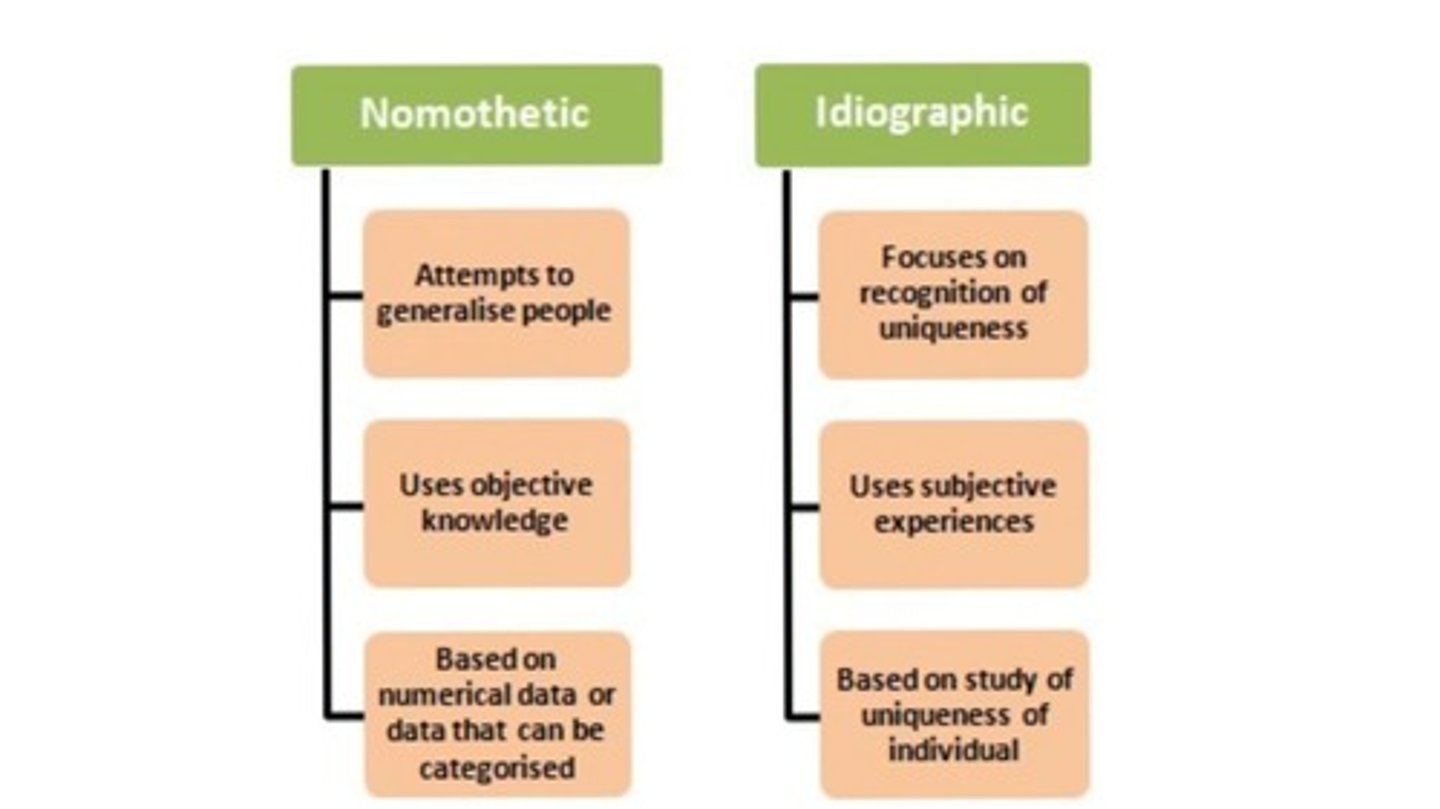
What methods would you use for the ideographic approach?
Methods that produce qualitative data - case studies, unstructured interviews. Usually considered subjective.

What is an example of the ideographic perspective?
The Humanistic approach. Rogers and Maslow were only interested in documenting the conscious experience of the individual or the 'self'

Nomothetic approach
Using a large sample of participants to establish laws or generalisations that apply to all people. This then provides a basis for future behaviour being predicted and possibly controlled. Psychology strives to be nomothetic.
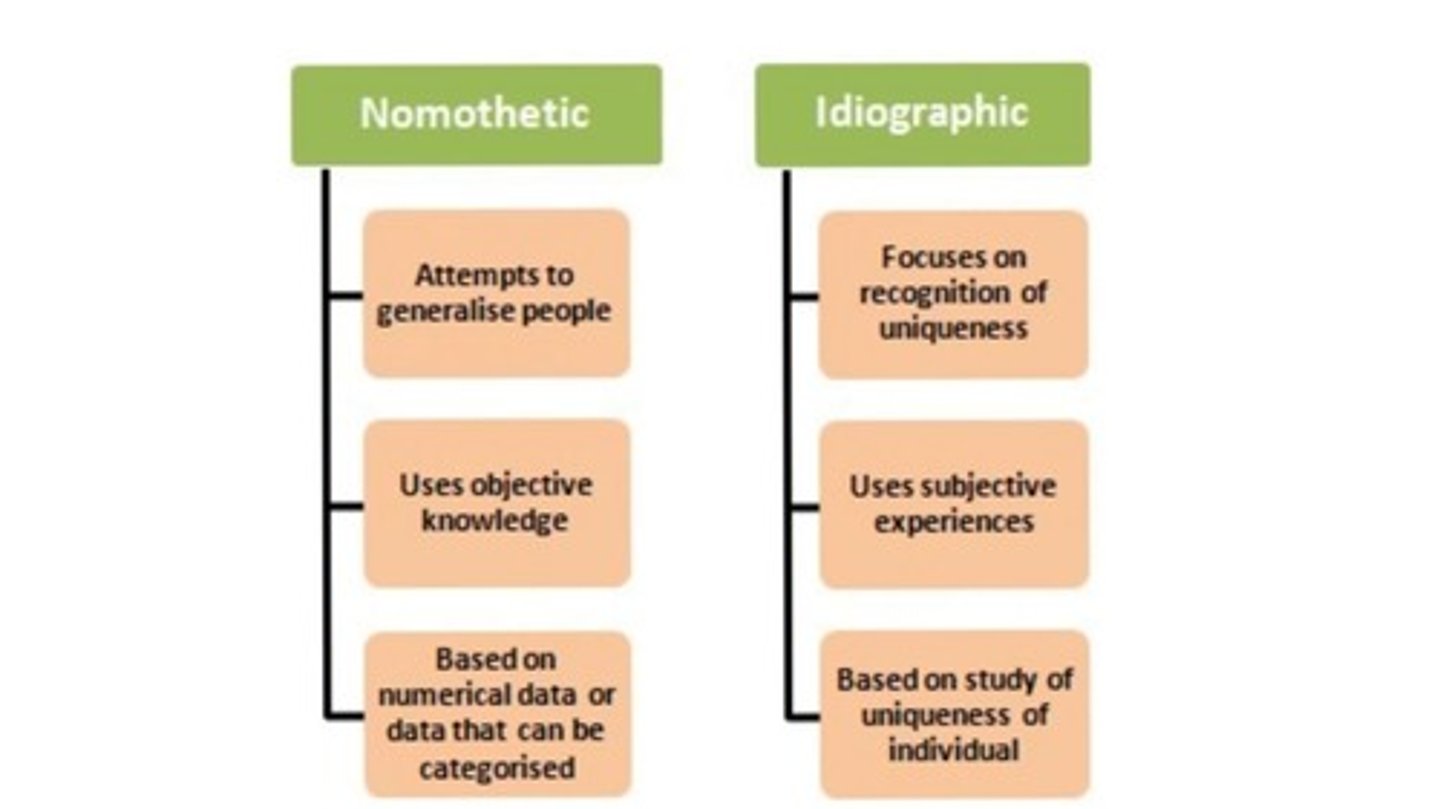
What are some research examples of the nomothetic approach?
- Milgram using a sample to propose theory of situational obedience
- Ainsworth testing infants using Strange Situation to propose 3 attachment types

What methods would you use for the nomothetic approach?
Scientific and quantitative methods (such as experiments). Hypotheses are rigorously tested, statistically analysed and general laws and principles are proposed and developed. Considered objective.

How have behaviourists conducted research which is nomothetic?
Skinner and the behaviourists studied the responses of hundreds of cats, rats, pigeons etc. to develop the laws of learning

How has cognitive psychologists' research been nomothetic?
Cognitive psychologists have been able infer the structure and processes of human memory by measuring large samples in lab tests.

How has biological psychologists' research been nomothetic?
Biological psychologists have conducted brain scans on countless human brains to make generalisations about localisation of function.
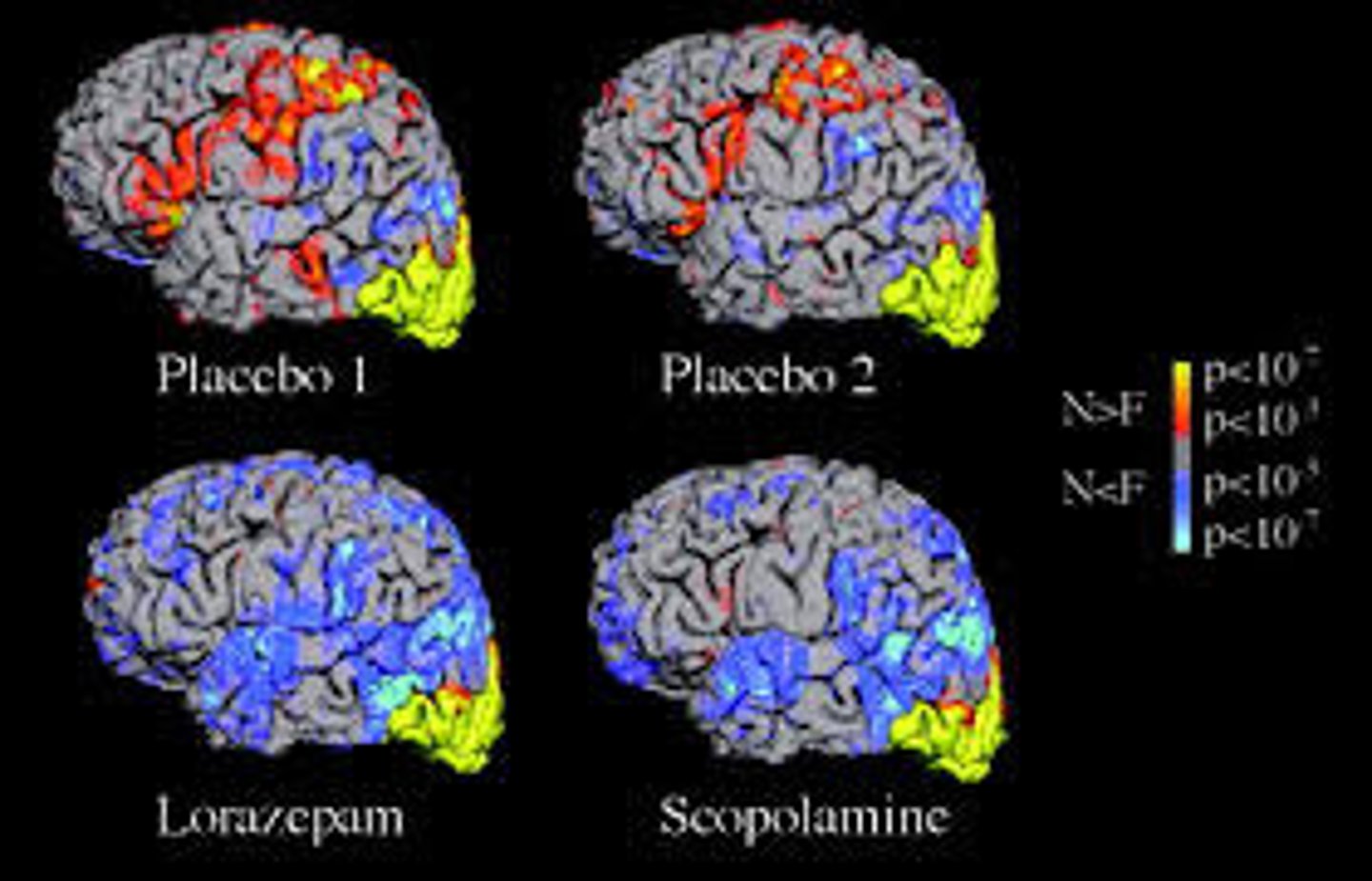
What is support for the idiographic approach?
It provides a more complete and in depth account of the individual. This may complement the nomothetic approach by gathering more info on general laws or challenging such laws. For example HM (memory case study) indicated that LTM was not a unitary store and procedural memory was one such separate store. This can be used to generate hypotheses that can later be tested experimentally.
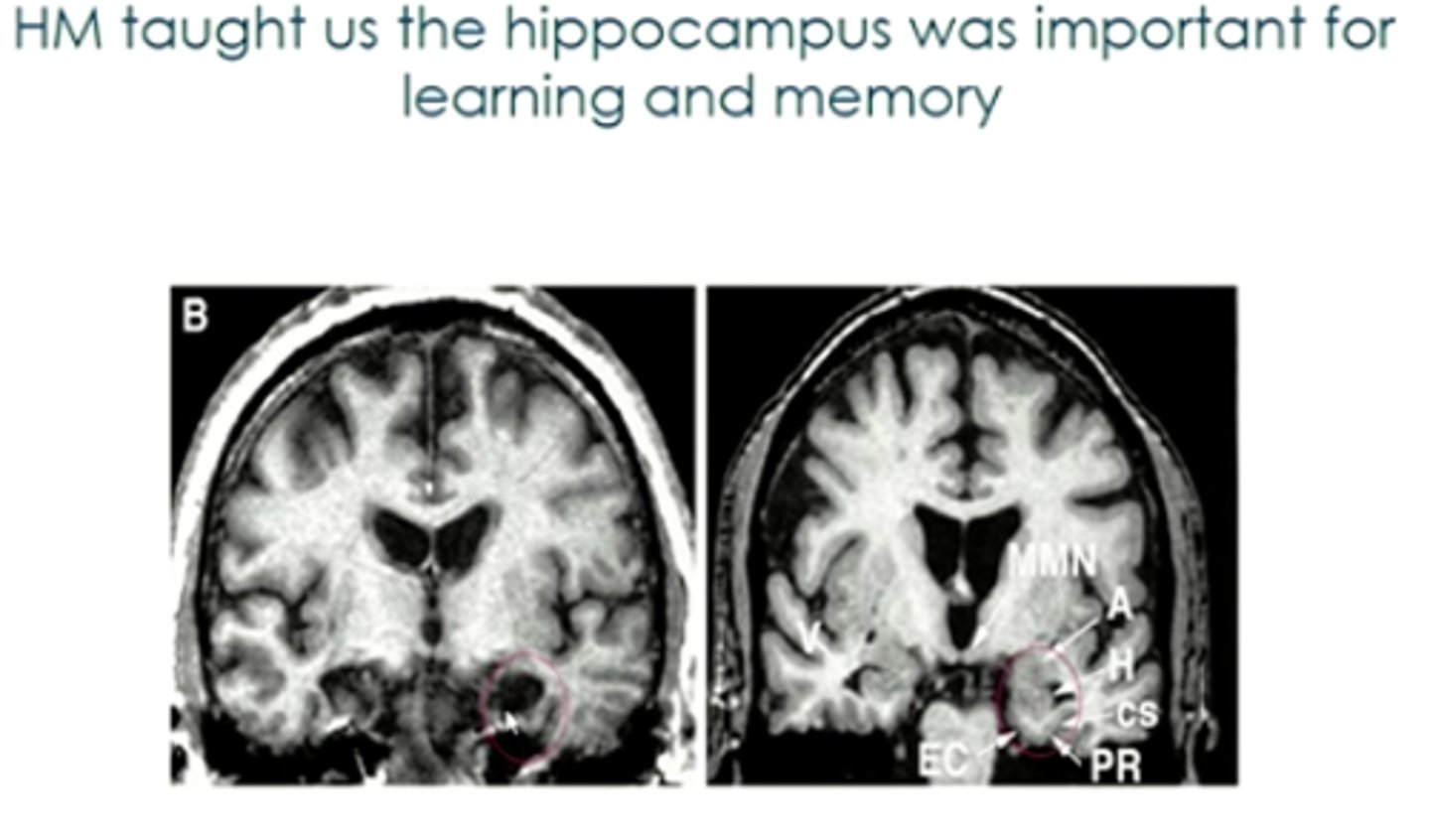
What are the arguments against the ideographic approach?
Leads to lack of generalisability. Meaningful generalisations can't be made on the basis of limited evidence. E.g. Freud's Oedipus complex was criticised as it was developed from a single case study (Little Hans). As case studies tend to be the least scientific, conclusions often rely on the subjective interpretation of the researcher, and so are open to bias.

What is support for the nomothetic approach?
Processes involved in research tend to be more scientific (testing under standardised conditions, using statistical analysis, prediction and control). Such processes have enabled psychologists to establish 'norms' of behaviour (such as the average IQ of 100). Gives psychology greater scientific credibility.
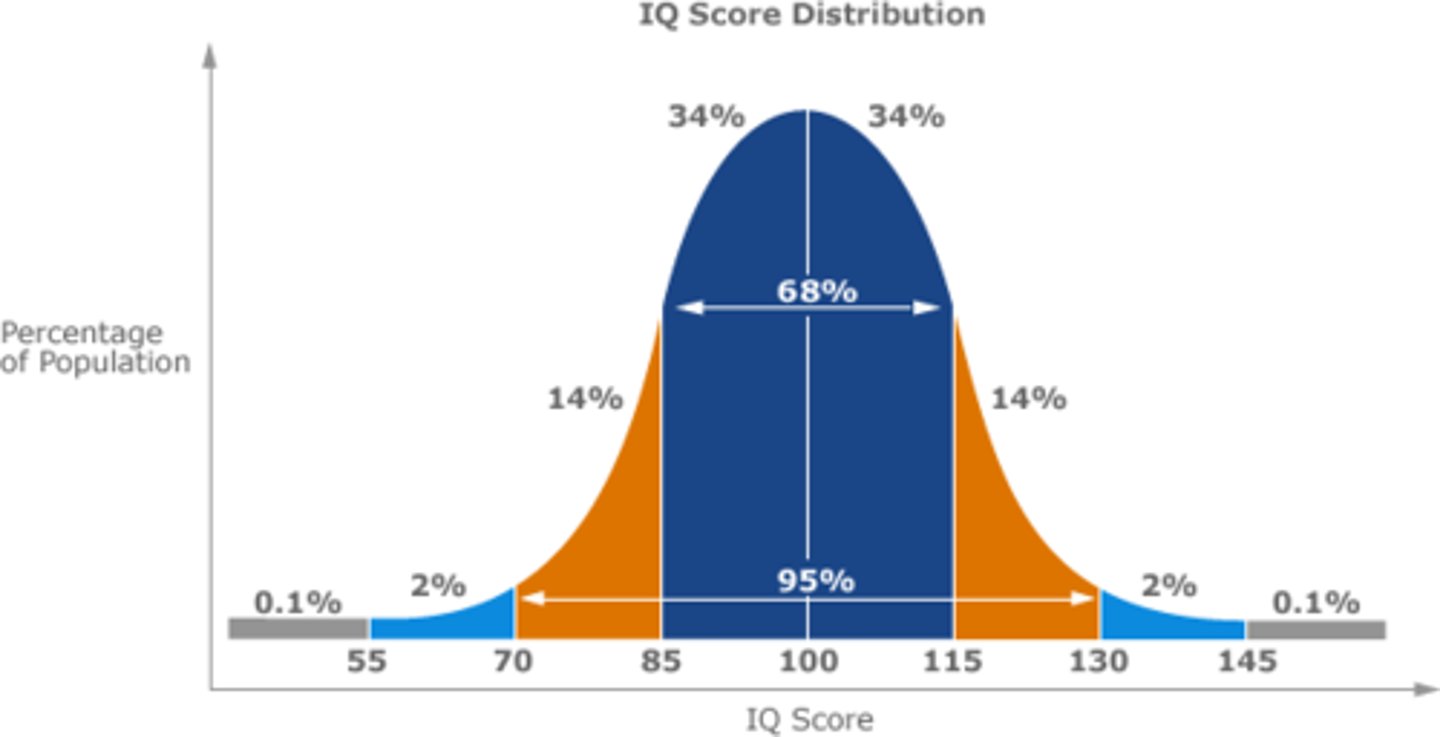
What is the argument against the nomothetic approach?
Has been accused that it loses the 'whole person'. Knowing there is a 1% lifetime risk of developing SZ tells us nothing about what life is like for someone who does. Generalising overlooks the richness of human experience.

Ethical implications in research
The way that research impacts on those who take part in research and also on the way the findings are communicated to the public and how the findings are used.
Socially sensitive research
Studies in which there are potential consequences or implications, either directly for the participants in the research or for the class of individuals represented by the research.
What is an example of socially sensitive research?
Bowlby's work on attachment (women affected) and Quinton's work on effects of institutionalisation (also women affected)

What concerns did Sieber and Stanley (1988) identify that researchers should be mindful of?
- Implications: what will happen in society due to our change in understanding? Could its interpretation lead to discrimination? E.g. what would happen if IQ was found to be purely genetic?
- Uses/public policy: will the results be used in public policy to justify laws that harm the people studied or wider society? E.g. what if aggressive behaviours were shown to be due to chemical imbalances that could be altered by putting additives in food?
- Validity of research: are the findings a result of sound methodology?
How to deal with socially sensitive research?
- Ethics Committees: final decision not made by researcher but by a panel who judge the value of the research
- Cost benefit analysis: Judging potential costs and benefits to society of the research
- Take care when publishing findings
- BPS code of conduct and ethics
What are the benefits of conducting socially sensitive research?
Scarr (1988) argues that studies of underrepresented groups and issues promotes greater sensitivity and understanding. E.g. homosexuality - 1952 DSM listed it as a 'sociopathic personality disorder' but finally removed it in 1973. This was largely due to the Kinsey report (Kinsey et al, 1948) who concluded that homosexuality is a typical expression of human sexual behaviour. This illustrates the importance of researchers tackling sensitive topics.

What are the implications of socially sensitive research?
Could be negative consequences for the groups being studied. E.g. research investigating genetic basis of criminality has found that there is a 'criminal gene'. If this is true, someone could be convicted on the basis of their genes or they could argue they should be excused as they cannot be held responsible (ignores free will).
How has socially sensitive research benefited society?
Questioning the validity of EWT was once controversial, but has now led to improvements in information gathering and reduced the risk of miscarriages in justice.
What is the problem with bias in socially sensitive research?
The way in which research questions are phrased and investigated may influence the way in which findings are interpreted. E.g. cross-cultural research may be blighted by cultural superiority and ethnocentrism. Ainsworth's Strange Situation is a good example of how research based on Western culture cannot always transfer directly to other cultures. Many Japanese infants were likely mislabelled as 'insecure-resistant' when the context in which they were raised was not understood.
